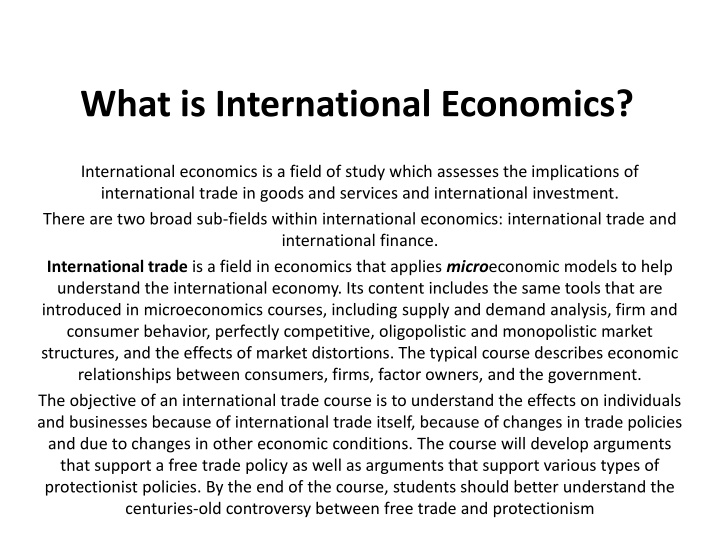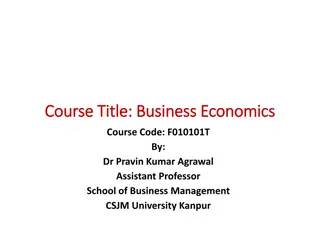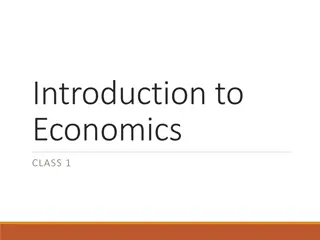Overview of International Economics Field
International Economics examines the impact of global trade and investment, encompassing international trade and finance. Key topics include trade policies, market structures, effects of international trade, and the ongoing debate between free trade and protectionism. The field analyzes how nations interact through trade, money flows, and investments, emphasizing the significance of international economic ties in today's interconnected world.
Download Presentation

Please find below an Image/Link to download the presentation.
The content on the website is provided AS IS for your information and personal use only. It may not be sold, licensed, or shared on other websites without obtaining consent from the author.If you encounter any issues during the download, it is possible that the publisher has removed the file from their server.
You are allowed to download the files provided on this website for personal or commercial use, subject to the condition that they are used lawfully. All files are the property of their respective owners.
The content on the website is provided AS IS for your information and personal use only. It may not be sold, licensed, or shared on other websites without obtaining consent from the author.
E N D
Presentation Transcript
What is International Economics? International economics is a field of study which assesses the implications of international trade in goods and services and international investment. There are two broad sub-fields within international economics: international trade and international finance. International trade is a field in economics that applies microeconomic models to help understand the international economy. Its content includes the same tools that are introduced in microeconomics courses, including supply and demand analysis, firm and consumer behavior, perfectly competitive, oligopolistic and monopolistic market structures, and the effects of market distortions. The typical course describes economic relationships between consumers, firms, factor owners, and the government. The objective of an international trade course is to understand the effects on individuals and businesses because of international trade itself, because of changes in trade policies and due to changes in other economic conditions. The course will develop arguments that support a free trade policy as well as arguments that support various types of protectionist policies. By the end of the course, students should better understand the centuries-old controversy between free trade and protectionism
International economics is about how nations interact through: trade of goods and services, flows of money, and investment. International economics is an old subject, but continues to grow in importance as countries become tied more to the international economy. Nations are now more closely linked than ever before. U.S. exports and imports as shares of gross domestic product have been on a long-term upward trend. International trade has roughly tripled in importance compared to the economy as a whole in the past 50 years. Both imports and exports fell in 2009 due to the recession.
PRICE:If foreign companies can produce or offer goods and services more cheaply, then it may be beneficial to go for foreign trade. QUALITY If the companies abroad can offer good and services of superior quality. For instance, Scotch Whiskey from Scotland is considered to be superior. Scotland exports around 37 bottles of Scotch per second. AVAILABILITY If it is impossible to produce that product domestically, like a special variety of fruit or a mineral. For instance, Japan has no natural reserves of oil, and thus, it imports all its oil. DEMAND If a demand for a product or services is more in a country than what it can domestically produce, then it goes for import.
ADVANTAGES OF INTERNATIONAL TRADE COMPARATIVE ADVANTAGE It allows countries to specialize in producing only those goods and services, which it is good at. ECONOMIES OF SCALE If a country wants to sell its goods in the international market, it will have to produce more thanhat is needed to meet the domestic demand. So, producing higher volume leads to economies of scale, meaning the cost of producing each item is reduced. COMPETITION Selling goods and services in the foreign market also boosts the competition in that market. In a way, it is good for local suppliers and consumers as well. Suppliers will have to ensure that their prices and quality is competitive enough to meet the foreign competition. TRANSFER OF TECHNOLOGY International trade often leads to the transfer of technology from a developed nation to the developing nation. Govt. in the developing nation often lay terms for foreign companies that involve developing local manufacturing capacities.
MORE JOB CREATION Increase in international trade also creates job opportunities in both countries. That s a major reason why big trading nations like the US, Japa, and South Korea have lower unemployment rates.
DISADVANTAGES OF INTERNATIONAL TRADE OVER-DEPENDENCE Countries or companies involved in the foreign trade are vulnerable to global events. An unfavorable event may impact the demand of the product, and could even lead to job losses. For instance, the recent US- China trade war is adversely affecting the Chinese export industry. UNFAIR TO NEW COMPANIES New companies or start-ups who don t have much resources and experience may find it difficult to compete against the big foreign firms.
A THREAT TO NATIONAL SECURITY If a country is over dependant on the imports for strategic industries, then exporters may force it to take a decision that may not be in the national interest. PRESSURE ON NATURAL RESOURCES A country only has limited natural resources. But, if it opens its doors to the foreign companies, it could drain those natural resources much quicker.























